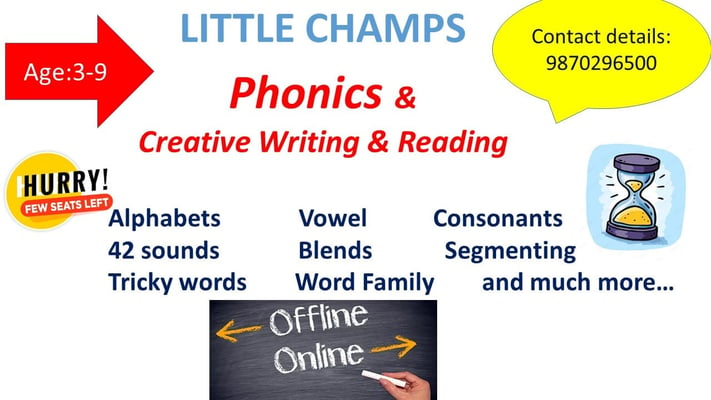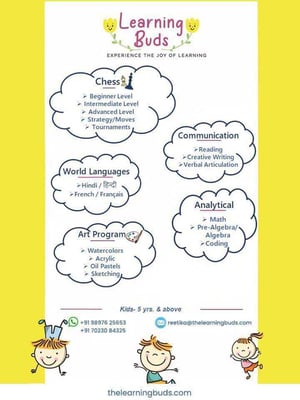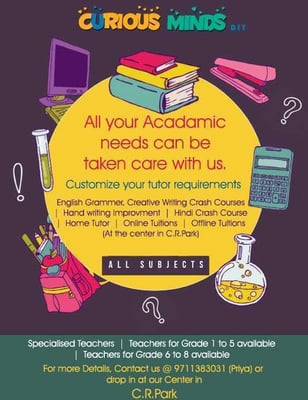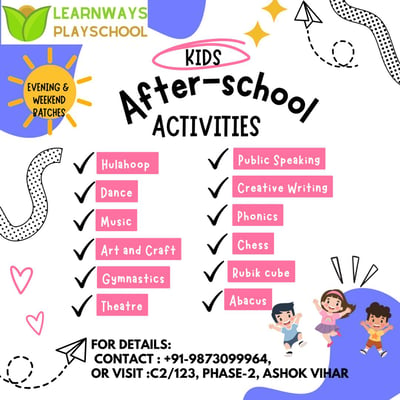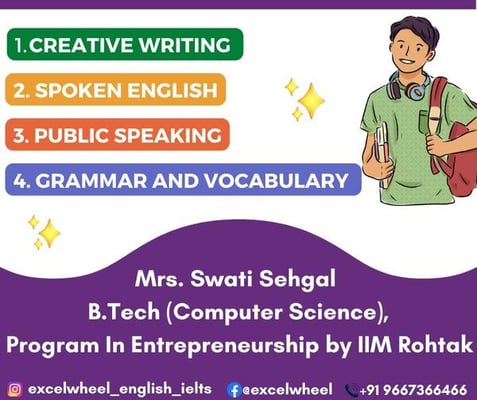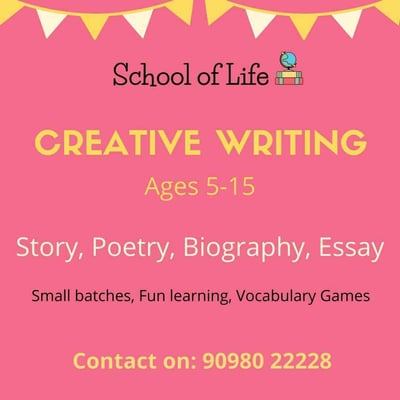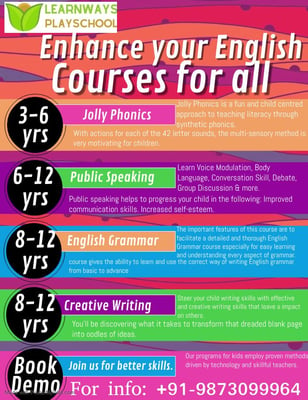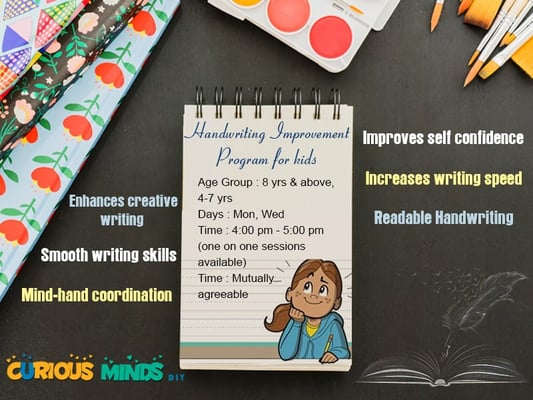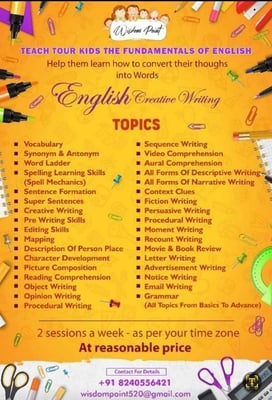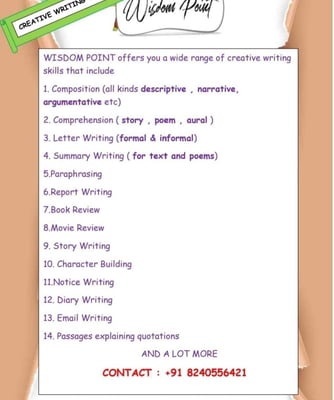Creative Writing classes for Kids - 37 options found
Creative writing classes for children aged 2 to 15 offer num... Creative writing classes for children aged 2 to 15 offer numerous benefits, including literacy development, fostering creativity and imagination, enhancing communication skills, building confidence, promoting critical thinking, and fostering cultural and emotional awareness. Through writing activities, children express themselves authentically, develop empathy, and explore diverse perspectives. These classes provide a platform for self-expression, encourage problem-solving, and empower children to find their voice. Creative writing skills are valuable in various academic and professional pursuits, making these classes essential for children's holistic development and future success. Read more
school of life-creative writing
excel wheel-english class
learnways playschool-english courses
funscads-calligraphy classes
Advantages of Creative Writing Classes for Children Ages 2 to 15
Creative writing classes offer children aged 2 to 15 a range of benefits, from enhancing their literacy skills to fostering creativity and imagination. In this comprehensive guide, we'll explore the advantages of creative writing classes for children in this age range, potential limitations, and address common questions regarding its impact on brain development, personality development, and future career opportunities.
Introduction
Creative writing classes provide children with opportunities to explore their creativity, express themselves, and develop essential writing skills. These classes encompass various forms of writing, including storytelling, poetry, journaling, and fiction, tailored to different age groups and skill levels.
Advantages
-
Literacy Development:
- Language Skills: Creative writing classes help children develop their vocabulary, grammar, and syntax, improving their overall language proficiency.
- Reading Comprehension: Engaging in writing activities enhances children's reading comprehension skills as they analyze and interpret written texts.
-
Creativity and Imagination:
- Expressive Outlet: Creative writing classes provide a platform for children to express their thoughts, feelings, and ideas in imaginative ways, fostering creativity and originality.
- Problem-Solving: Writing stories and crafting narratives encourage children to think critically and solve problems creatively, honing their analytical and creative thinking skills.
-
Communication Skills:
- Effective Communication: Through writing, children learn to articulate their thoughts and communicate effectively, improving their verbal and written communication skills.
- Empathy and Perspective-Taking: Writing from different perspectives and exploring diverse characters help children develop empathy and understanding of others' experiences and viewpoints.
-
Confidence Building:
- Self-Expression: Creative writing classes empower children to find their voice and express themselves authentically, boosting their self-confidence and self-esteem.
- Positive Feedback: Constructive feedback and encouragement from teachers and peers in creative writing classes reinforce children's sense of accomplishment and validation.
-
Critical Thinking:
- Analytical Skills: Writing requires children to analyze information, synthesize ideas, and structure their thoughts logically, fostering critical thinking skills.
- Revision and Editing: Revising and editing their writing teaches children to evaluate their work critically, identify areas for improvement, and make revisions accordingly.
-
Cultural and Emotional Awareness:
- Cultural Exploration: Writing about different cultures, traditions, and historical events exposes children to diverse perspectives and promotes cultural awareness.
- Emotional Expression: Writing allows children to explore and process their emotions, promoting emotional intelligence and self-awareness.
Limitations
-
Individual Differences:
- Varied Skill Levels: Children may have different levels of proficiency in writing, which can pose challenges in providing personalized instruction and support in a classroom setting.
- Attention Span: Younger children may have shorter attention spans and may struggle to focus on writing tasks for extended periods.
-
Resource Constraints:
- Access to Materials: Not all children may have access to the resources, such as books, writing tools, and technology, needed to fully engage in creative writing activities.
- Time Constraints: Limited class time and competing demands from other subjects and activities may restrict the amount of time dedicated to creative writing instruction.
Common Questions
-
Can Creative Writing Classes Improve Academic Performance?
- Yes, creative writing classes can improve academic performance by enhancing literacy skills, critical thinking abilities, and communication skills, which are transferable to other academic subjects.
-
How Can Parents Support Creative Writing at Home?
- Parents can support creative writing at home by providing writing prompts, encouraging journaling, and creating a supportive environment where children feel free to express themselves creatively.
-
What Career Opportunities Does Creative Writing Offer?
- Creative writing can lead to various career opportunities, including authorship, journalism, content writing, advertising, and publishing, as well as careers in fields such as education, marketing, and media.
-
Is Creative Writing Only for Children Interested in Writing as a Career?
- No, creative writing is beneficial for all children, regardless of their career aspirations. It promotes literacy, creativity, critical thinking, and self-expression, which are valuable skills in any field.
Conclusion
Creative writing classes offer children aged 2 to 15 a range of benefits, including literacy development, creativity and imagination, communication skills, confidence building, critical thinking, and cultural and emotional awareness. While there may be limitations related to individual differences and resource constraints, the overall advantages of creative writing classes are significant. By providing children with opportunities to explore their creativity, express themselves, and develop essential writing skills, creative writing classes play a vital role in their academic and personal development, setting a foundation for success in school and beyond.






